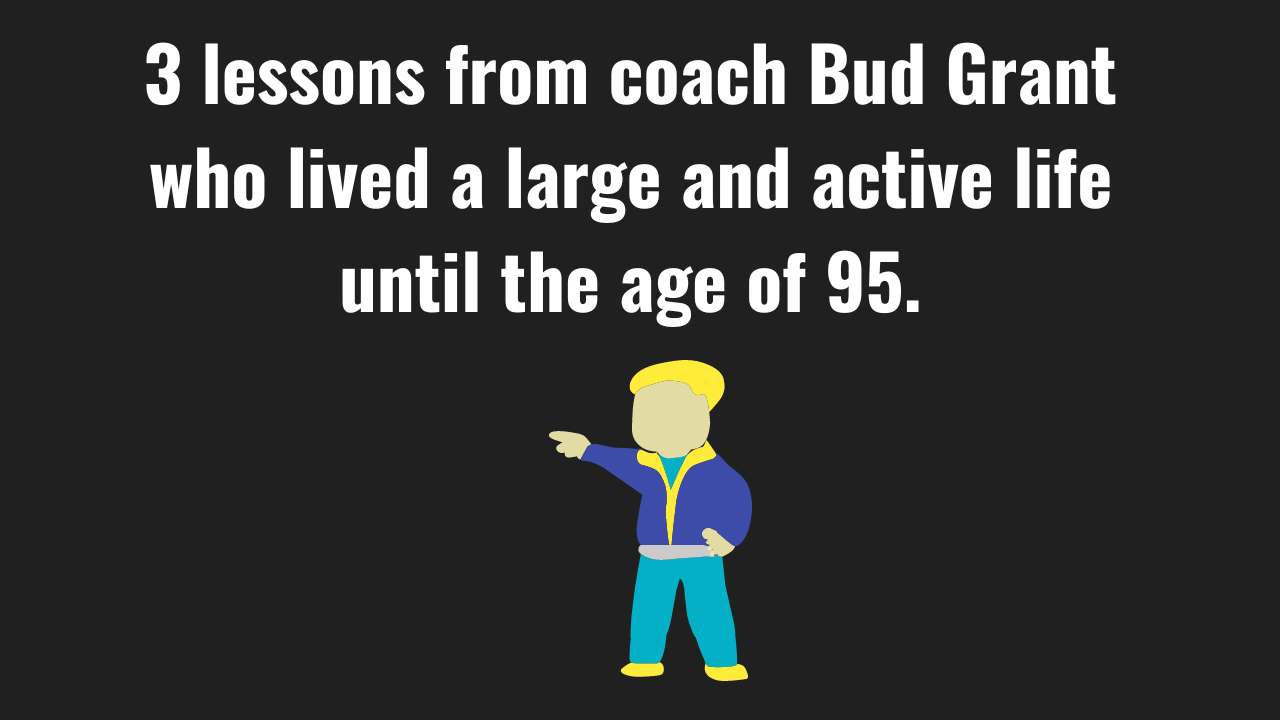Long time coach of the MN Vikings, Bud Grant recently passed away. He was 95 years old.
I grew up watching him coach outside in the frigid Minna-snow-da winters.
For those who are not football fans (and this does have some important fitness lessons), Bud Grant was a legendary former football coach who was widely recognized for leading the Vikings to four Super Bowl appearances in the 1970s, though they never won.
Bud was highly regarded for his no-nonsense approach, ability to build and maintain strong teams, and especially for his emphasis on discipline and preparation. He was also known for his willingness to adapt and innovate in order to achieve success.
Another notable aspect of Bud Grant’s coaching style was his willingness to have the Vikings play outside in frigid conditions, a decision that earned him the nickname “The Iceman.”
Bud believed his team could gain an advantage by preparing for the cold weather and forcing their opponents to adapt. He had his team practice and play games without gloves or sideline heaters. The players weren’t thrilled, but they understood his thinking.
Lesson 1: Temperature differences create robustness
I believe that training your body’s ability to handle both cold and heat better allows you to recover faster and be more robust. Temperature is pillar 1of the 4 homeostatic regulators I cover in the Physiologic Flexibility Cert.
Maybe Bud was on to something there.
Add some cold or heat to your current routine.
Lesson 2: Not every day is game day in the gym
Bud was also known for keeping practices light so his players would be ready for the big game on Sunday. This wasn’t the norm back then, and many other coaches were notorious for having players do 2 or sometimes 3 hard practices per day. Bud watched how each player moved and performed and allowed tired-looking players to take a day off.
As much fun as it is to crush huge PRs in the gym, that’s not an everyday occurrence, so act accordingly.
Most days are “punch the clock” days as coach Dan John calls them.
Show up.
Get in some quality work.
Leave to lift another day.
Over time, those days add up to big PRs.
If you’re feeling off, do what you can with as much quality as possible and leave to give it a go another day.
The key is violent consistency. Show up day in and day out.
Lesson 3: Recreation/having a life outside the gym is important
Another way Bud bucked the trend was to leave the office in time to get home for dinner. He believed in working hard while you were there and then leaving to coach another day.
He famously said once in a NY Times article form 1984,
“A good coach needs a patient wife, a loyal dog and a great quarterback, but not necessarily in that order. I happen to have been blessed with all three, and when I did happen to have any extra time I didn’t spend it with the quarterback.”
As much as I know you love lifting (me too), make sure to expand your hobbies to recreation outside the gym.
Learn to surf or kiteboard!
Play tennis.
Take up BJJ.
Learn to play golf.
Or even pick up the guitar.
Or as a last resort, learn pickleball – haha.
Do some movement outside the 4 walls of the gym. Avoid becoming a sea slug. Your body and mind will thank you. I cover this topic in detail in the Exercise Intervention in the Flex Diet Cert which opens again June 5.
There you have 3 lessons from coach Bud Grant who lived a large and active life until the age of 95.
May he rest in peace and we can all apply a few of these lessons today.
Rock on!

Dr. Mike T Nelson

Dr. Mike T Nelson
PhD, MSME, CISSN, CSCS Carrick Institute Adjunct Professor Dr. Mike T. Nelson has spent 18 years of his life learning how the human body works, specifically focusing on how to properly condition it to burn fat and become stronger, more flexible, and healthier. He’s has a PhD in Exercise Physiology, a BA in Natural Science, and an MS in Biomechanics. He’s an adjunct professor and a member of the American College of Sports Medicine. He’s been called in to share his techniques with top government agencies. The techniques he’s developed and the results Mike gets for his clients have been featured in international magazines, in scientific publications, and on websites across the globe.
- PhD in Exercise Physiology
- BA in Natural Science
- MS in Biomechanics
- Adjunct Professor in Human
- Performance for Carrick Institute for Functional Neurology
- Adjunct Professor and Member of American College of Sports Medicine
- Instructor at Broadview University
- Professional Nutritional
- Member of the American Society for Nutrition
- Professional Sports Nutrition
- Member of the International Society for Sports Nutrition
- Professional NSCA Member










Leave A Comment